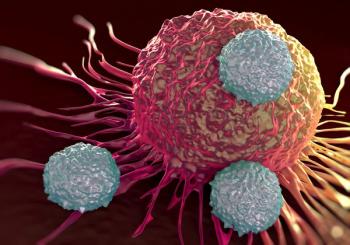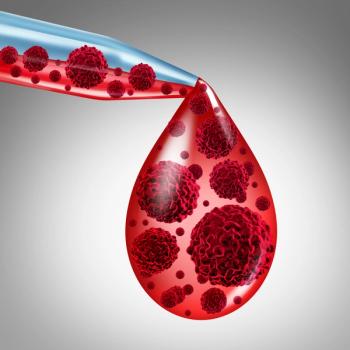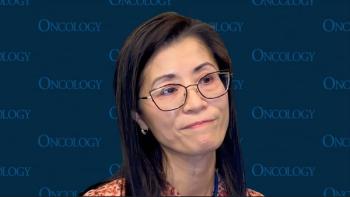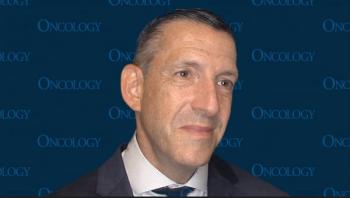
A real-world analysis of teclistamab, elranatamab, and talquetamab showed comparable outcomes in relapsed or refractory multiple myeloma.

Your AI-Trained Oncology Knowledge Connection!


A real-world analysis of teclistamab, elranatamab, and talquetamab showed comparable outcomes in relapsed or refractory multiple myeloma.

The EPCORE NHL-1 trial showed a 41% complete response rate with epcoritamab for patients with relapsed/refractory LBCL.

More follow-up data will better elucidate the impact of frontline use of hypomethylating agents in patients with myelodysplastic syndromes.

Epcoritamab monotherapy led to long-term disease-free remissions in patients with relapsed/refractory large B-cell lymphoma who achieved complete response at 2 years.

The median overall survival with cilta-cel exceeds 5 years among patients with relapsed/refractory multiple myeloma in the CARTITUDE-1 trial.

An expert panel highlights key presentations in multiple myeloma, lymphoma, and other hematologic malignancies at the 2025 ASCO Annual Meeting.

The 1-year progression-free survival rate for patients in the BCMA/GPRC5D naïve RP2D group was 95.0% and across all dose levels it was 74.1%.

Results from the EPCORE NHL-1 trial shared at the 2025 ASCO Annual Meeting found positive responses in patients with relapsed/refractory large B-cell lymphoma.

Results from part 1 dose level G of the MagnetisMM-6 trial found elranatamab, daratumumab, and lenalidomide to be safe and manageable in NDMM.

The KOMET-001 trial meets its primary end point of CR/CRh rate among patients with NPM1-mutated acute myeloid leukemia.

Daratumumab plus KRd improved MRD negativity and PFS vs KRd alone in patients with newly diagnosed multiple myeloma.

Results from the PERSEUS trial support daratumumab plus bortezomib, lenalidomide, and dexamethasone as a standard of care in transplant-eligible NDMM.

Subgroup data from the CEPHEUS trial reinforce daratumumab plus bortezomib, lenalidomide, and dexamethasone as a standard of care in this population.

Phase 3 VERIFY study findings showed rusfertide maintained a manageable safety profile consistent with previous studies.

The dual high-affinity binding observed with ISB 2001 may avoid resistance mechanisms reported with other BCMA-targeted therapies.

Subgroup data from CARTITUDE-4 suggest that cilta-cel may overcome the poor prognosis associated with some high-risk features in multiple myeloma.

PFS was improved with belantamab mafodotin triplet for patients with relapsed/refractory multiple myeloma with high-risk cytogenetics.

The safety profile of talquetamab continued to show a lower high-grade infection risk relative to other approved anti-BCMA bispecific antibodies.

The safety profile for glofitamab plus gemcitabine and oxaliplatin in diffuse large B-cell lymphoma was consistent with known risks for individual drugs.

At a median follow-up of 17.0 months, the sintilimab/chidamide regimen elicited 1-year PFS and OS rates of 95.7% and 95.3%, respectively.

Findings support the established safety profile of lisocabtagene maraleucel across hematologic oncology indications.

After a median follow-up of 31.2 months, the objective response rate was 97.4% among patients with CLL/SLL.

With longer-term follow-up, investigators observed no new safety signals for zanubrutinib in patients with CLL or SLL harboring 17p deletions.

Treatment with KITE-363 yields no dose-limiting toxicities in a first-in-human phase 1 study.

All patient populations benefitted from glofitamab in a phase 1/2 trial, but the design excluded capture of high-risk features present in similar studies.

Data from the EPCORE NHL-1 trial support the safety and feasibility of epcoritamab for patients with relapsed/refractory follicular lymphoma.

Adverse effects associated with oral azacitidine in low- or intermediate-risk MDS are typically transient, according to Mikkael A. Sekeres, MD, MS.

The safety profile of oral azacitadine was shown to be similar across the 200-mg and 300-mg arms in patients with lower- to intermediate-risk MDS.

The addition of tucidinostat to R-CHOP demonstrated promising safety and efficacy outcomes in patients with previously untreated diffuse large B-cell lymphoma) expressing MYC and BCL-2, according to interim analysis results.

Ongoing genomic profiling analyses in the ASC4FIRST trial may further determine which patients with CML may benefit from treatment with asciminib.